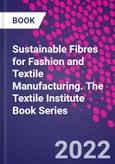With a particular focus on apparel manufacturing, different applications of sustainable fibres are explored along with manufacturing techniques and details of the material properties. New research investigating nontraditional sources of textile fibres such as lotus, orange, milk, seaweed, corn, and mushroom are all presented, providing a uniquely comprehensive resource. Drawing on work by contributors from a variety of fields and roles in industry and academia, this book shares solutions and new perspectives on this interdisciplinary topic more widely in the hope of leading to research breakthroughs.
Please Note: This is an On Demand product, delivery may take up to 11 working days after payment has been received.
Table of Contents
Part One Introduction to sustainable fibres
1 Traditional fibres for fashion and textiles: Associated problems and future sustainable fibres
2 Introduction to sustainable fibres for fashion and textiles
Part Two Sustainable natural fibres
3 Organic cotton and BCI-certified cotton fibres
4 Hemp, flax and other plant fibres
5 Lotus fibre drawing and characterization
6 Macrophyte and wetland plant fibres
7 Mushroom and corn fibredthe green alternatives to unsustainable raw materials
8 Wool and silk fibres from sustainable standpoint
9 Sustainable protein fibres
Part Three Sustainable synthetic fibres
10 Regenerated synthetic fibres: bamboo and lyocell
11 Sustainable polyester and caprolactam fibres
Part Four Fibres derived from waste
12 Orange fibre
13 Coffee fibres from coffee waste
14 Recycled fibres from polyester and nylon waste
15 Composites derived from biodegradable Textile wastes: A pathway to the future�
Part Five Organizations, standards and challenges
16 Organizations and certifications relating to sustainable fibres
17 Challenges and future directions in sustainable textile materials
18 Life cycle analysis of textiles and associated carbon emissions
Authors
Rajkishore Nayak Associate Professor, School of Communication and Design, RMIT University, Ho Chi Minh City, Vietnam.Rajkishore Nayak is an Associate Professor with the School of Communication & Design (SCD) at RMIT Vietnam. His research interests include new materialism, sustainability in fashion and textiles; circular fashion; waste management; and ethical fashion. Dr. Nayak has published 15 books and more than 150 high-impact journal papers. He is working in collaboration with universities in Africa, Europe, USA and Asia. Dr. Nayak is currently an Editorial member of various journals, including the Journal of Fashion Marketing and Management, and Fashion and Textiles. He is also an active member in SDC, ITA and AFC. He has extensive publications in high impact journals as well as books and book chapters.








